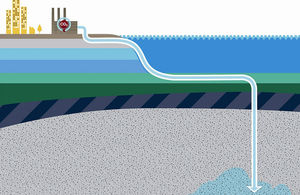International Carbon Capture and Storage
How the International Climate Fund (ICF) is building developing country capacity to deploy carbon capture and storage (CCS) technologies.

Carbon capture and storage graphic
Background
The current evidence presents a clear case that CCS is a critical ‘transformative’ technology to combat climate change; and that demonstration in developing countries needs to take place in parallel to developed countries.
Theme: Mitigation
This project supports mitigation by supporting developing countries in the deployment of CCS technologies, reducing the amount of carbon dioxide released into the Earth’s atmosphere.
Context
CCS is a key technology in the fight against dangerous climate change – the International Energy Agency (IEA) has estimated that on a least cost basis, CCS will be required to deliver 14% of the CO2 savings required by 2050 to enable us to keep global temperature rise at or below 2 °C. The IEA modelling shows that without CCS less abatement occurs at a higher cost - based on the Intergovernmental Panel on Climate Change (IPCC) assessment of CCS mitigation potential, costs to achieve a 50% reduction in CO2 emission in 2050 would increase by 70% (equivalent to $1.28 trillion annually).
What is being done?
The Department of Energy and Climate Change has committed up to £60 million of finance from the International Climate Fund (ICF) to support developing countries to develop both the technical and institutional knowledge necessary to enable the deployment of CCS technologies.
We have agreed to fund £35m and £25m respectively to Asian Development Bank and World Bank Trust Funds to support CCS capacity building projects. Financial support will be channeled toward a range of projects in China, Indonesia, South Africa and Mexico with the aim of ensuring sufficient political support is created to pave the way for full scale demonstration and, ultimately, the deployment of CCS.
The objectives of the two trust funds are to support strengthening capacity and knowledge sharing, to create opportunities for emerging economies to explore CCS potential, and to facilitate the inclusion of CCS options into low-carbon growth strategies and policies developed by national institutions. Activities vary in size and scope, and include: addressing legal and regulatory issues, investigating CO2 storage potential and supporting government-endorsed roadmaps for CCS development.
Expected Results
The project aims to raise the level of technical understanding of CCS within the key developing countries outlined above, leading to the establishment of necessary policy frameworks and incentive structures to support CCS demonstration and deployment.
The project also aims to raise the profile of CCS within host governments, build political support, and increase technical capability and leverage funding to support CCS capacity building activities from other donors.
Links to further info
Updates to this page
-
How the International Climate Fund (ICF) is building developing country capacity to deploy carbon capture and storage (CCS) technologies.
-
First published.